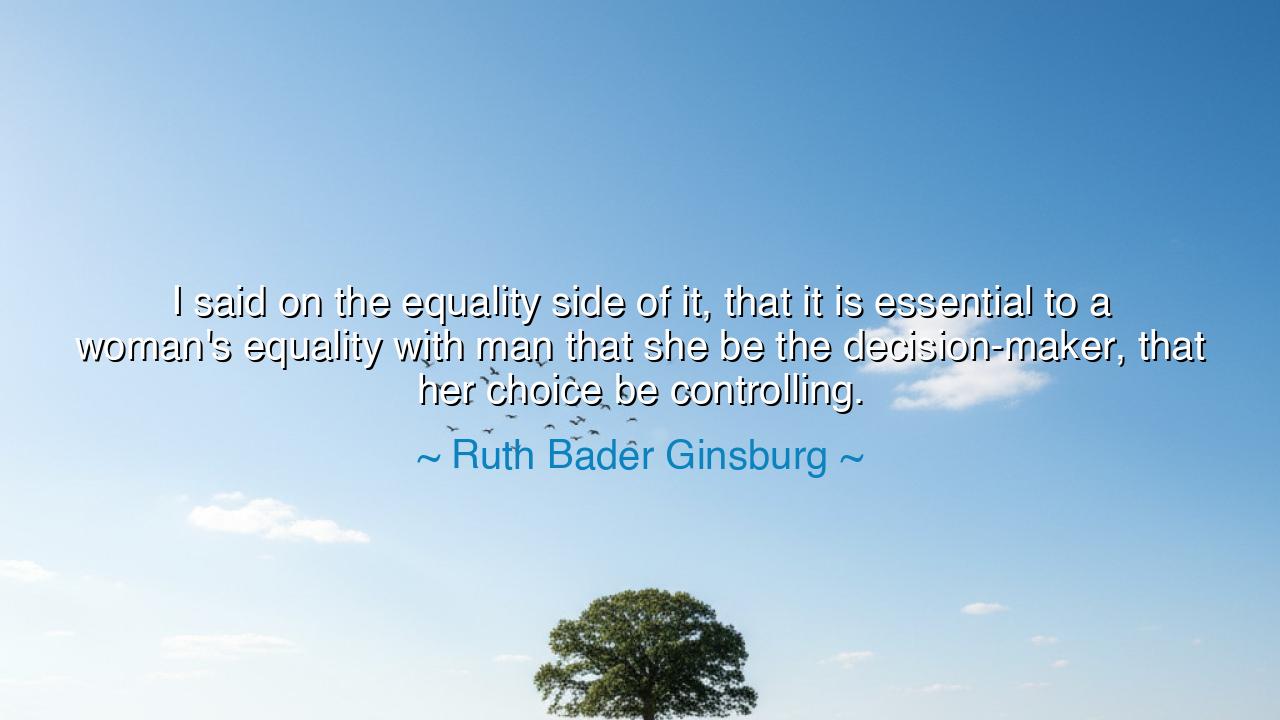
I said on the equality side of it, that it is essential to a
I said on the equality side of it, that it is essential to a woman's equality with man that she be the decision-maker, that her choice be controlling.






"I said on the equality side of it, that it is essential to a woman's equality with man that she be the decision-maker, that her choice be controlling." – Ruth Bader Ginsburg
Children of the earth, gather close, for today we speak of a truth that resonates with the pulse of freedom itself—a truth that has been sought by many but too long denied by some. Ruth Bader Ginsburg, a fierce and unyielding advocate for equality, reminds us that the very core of a woman’s equality with man lies in the power of her own choice. For in the deepest places of the soul, where dignity and humanity reside, the ability to make decisions—decisions that shape one’s life, body, and future—is the true measure of freedom. The choice is not a gift to be given or taken, but a right that must be firmly held by every woman, for in this, her equality is secured.
From the dawn of human history, women have often been denied the very right to choose. In the shadow of ancient patriarchies, their voices were silenced, their choices made for them by the whims of men. Yet, as the world turns and knowledge spreads, the truth becomes undeniable: the worth of a person—man or woman—is not defined by their gender, but by their autonomy, their agency, and their freedom. To say that a woman is not entitled to decide for herself is to strip her of her humanity, to deny her the very essence of what it means to be a person with dignity and power.
Look, children, to the struggles of Susan B. Anthony and Elizabeth Cady Stanton, who in the 19th century fought tirelessly for a woman’s right to vote, to be seen, and to be heard. Their struggle was not merely for a political right; it was for the fundamental recognition of women as equal human beings. Their fight was rooted in the belief that to be equal, a woman must hold the power to make decisions for herself—to have control over her life and her destiny. Ruth Bader Ginsburg continued this noble fight in the modern era, advocating for women’s rights and equality under the law, and reminding us that true equality cannot exist without the power of choice.
Equality is not a concept that can be granted by others; it is a fundamental right that each person must possess by their very nature. The right to choose—to decide one’s path, one’s future, one’s body—lies at the heart of this truth. It is not a privilege, but a necessity. Without this, there can be no equality, for without the freedom to make choices, a woman’s voice remains unheard, her worth diminished. Consider the struggles of Margaret Sanger, who fought for the right of women to have access to contraception, so they could control their own bodies and futures. Her work, though controversial in its time, was revolutionary in that it asserted that a woman’s body was hers to govern, that her choice in matters of reproduction should lie solely in her hands.
In the eyes of the ancients, choice was the essence of freedom. Societies that denied the right to choose were seen as holding their people—be they men or women—enslaved. Socrates, who taught the importance of self-governance and the need for each person to have control over their life, would have understood that a world where one half of the population is denied the right to choose their path is a world in deep unbalance. For in this imbalance, equality falters and the very fabric of society begins to unravel.
The lesson we must learn, dear children, is this: equality is not a gift that can be given by the powerful to the powerless. It is a truth that must be claimed, upheld, and fiercely protected. Choice is the cornerstone of equality, and it is the sacred right of every woman to make decisions about her own life, her own body, and her own future. To take this right from her is to deny her humanity. And in denying her, we deny ourselves, for in a world where one group is subjugated, the whole of society suffers.
Practical action lies in how we stand for equality—not just for women, but for all who have been denied the power to make their own decisions. When you see injustice, when you see that the right to choose is being denied, speak out. Support those who fight for the autonomy of all people. Educate yourself and others about the struggles that still persist, and never let the voice of equality be silenced. Stand, as Ruth Bader Ginsburg did, with the belief that equality for all is not just a dream, but a right worth fighting for. When we give every person the right to choose, we build a world that is just, balanced, and truly free.






AAdministratorAdministrator
Welcome, honored guests. Please leave a comment, we will respond soon